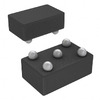Manufacturer Part Number
TPS73025DBVRG4
Manufacturer
Texas Instruments
Introduction
The TPS73025DBVRG4 is a low-dropout (LDO) linear voltage regulator designed for power-sensitive applications.
Product Features and Performance
Positive output configuration with a fixed 2.5V output
Capable of delivering 200mA of output current
Low dropout voltage of 0.21V at 200mA load improves efficiency
Low quiescent current of 250 µA suitable for battery-operated devices
Excellent PSRR of 68dB at 100Hz ensures stable output
Integrated features such as over current protection, over temperature protection, reverse polarity protection, and UVLO enhance reliability and safety
Product Advantages
High-efficiency due to low dropout voltage
Suitable for power-sensitive applications due to low Iq
Enhanced protection features improve product lifespan and safety
Wide operating temperature range from -40°C to 125°C allows use in diverse environmental conditions
Key Technical Parameters
Voltage Input (Max): 5.5V
Voltage Output (Min/Fixed): 2.5V
Current Output: 200mA
Voltage Dropout (Max): 0.21V @ 200mA
Current Quiescent (Iq): 250 µA
PSRR: 68dB (100Hz)
Operating Temperature: -40°C ~ 125°C
Quality and Safety Features
Over Current Protection
Over Temperature Protection
Reverse Polarity Protection
Under Voltage Lockout (UVLO)
Compatibility
Surface mount compatibility with SC-74A, SOT-753 package
Application Areas
Ideal for power management in portable devices, IoT devices, and other power-sensitive applications
Product Lifecycle
Discontinued at Digi-Key, indicating the product may be nearing the end of its lifecycle
Potential buyers should verify the availability of replacements or upgrades
Several Key Reasons to Choose This Product
High efficiency and low quiescent current make it ideal for battery-operated devices
Wide operating temperature range allows for use in a variety of conditions
Integrated protection features ensure a safer and more reliable operation
Discontinuation status makes it important for projects requiring long-term availability to consider future-proof alternatives



 TPS7301QPTexas InstrumentsIC REG LINEAR POS ADJ 500MA 8DIP
TPS7301QPTexas InstrumentsIC REG LINEAR POS ADJ 500MA 8DIP TPS73025YZQRTexas InstrumentsIC REG LINEAR 2.5V 200MA 5DSBGA
TPS73025YZQRTexas InstrumentsIC REG LINEAR 2.5V 200MA 5DSBGA TPS7301QDRTexas InstrumentsIC REG LIN POS ADJ 500MA 8SOIC
TPS7301QDRTexas InstrumentsIC REG LIN POS ADJ 500MA 8SOIC